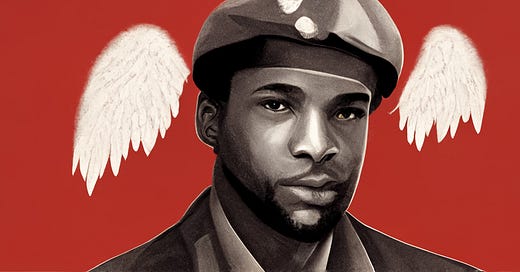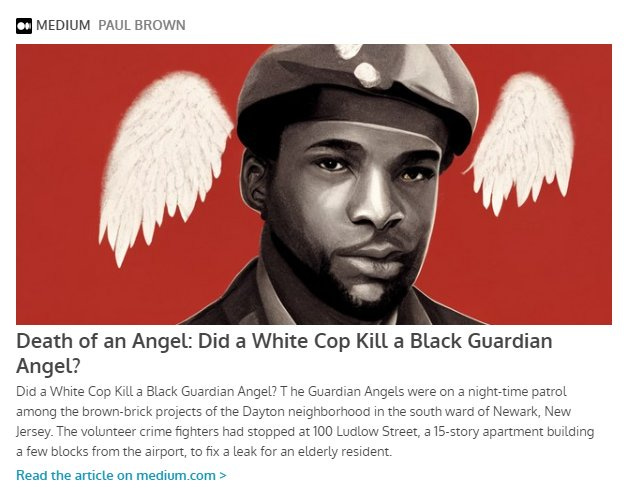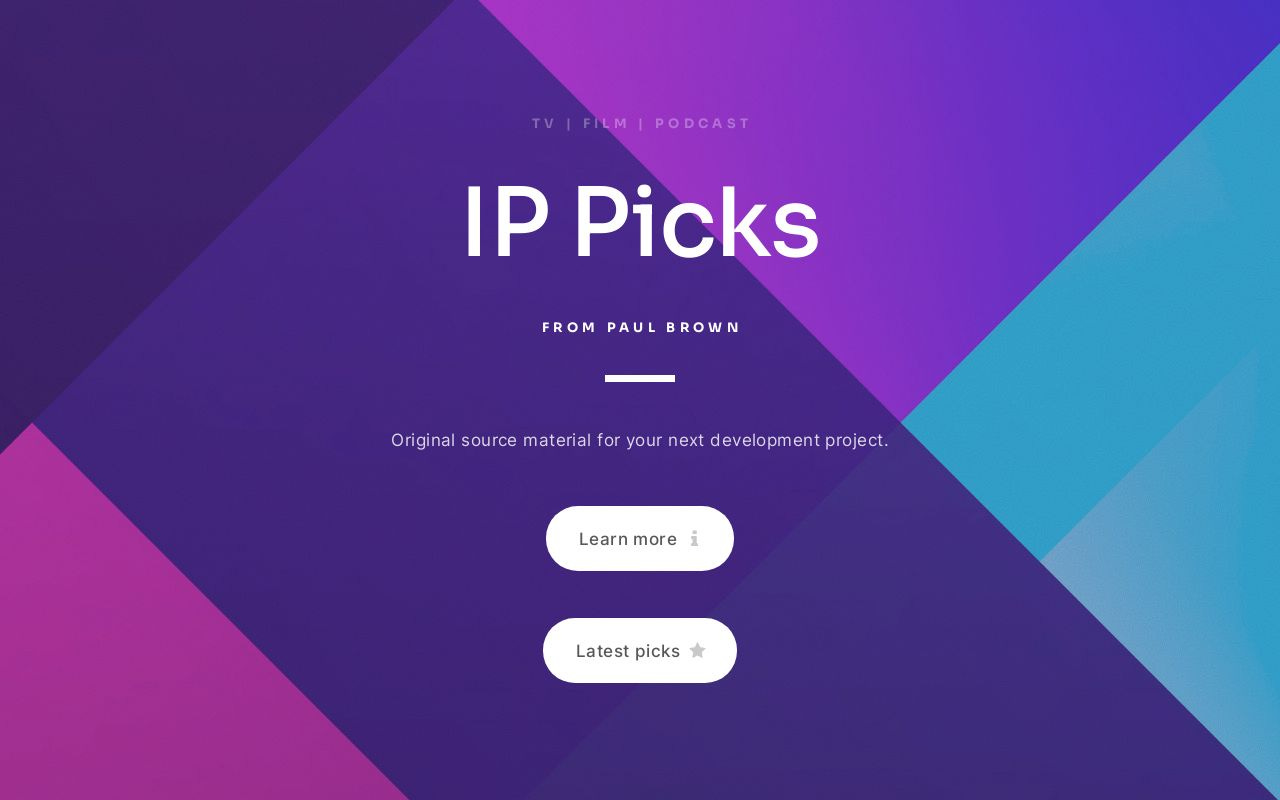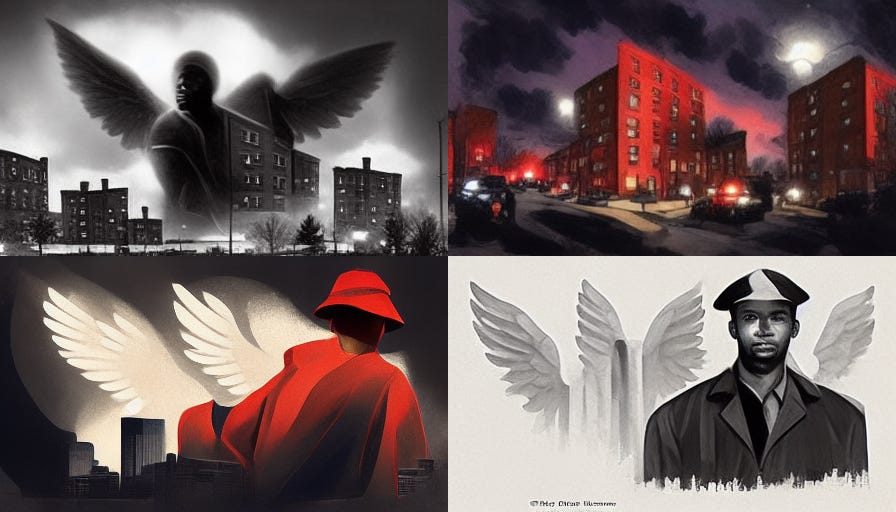At 11 PM on a cold and clear night, December 30, 1981, Frank Melvin, a 27-year-old Guardian Angel, was shot dead while on patrol near the Dayton Street Projects in Newark, New Jersey. Melvin was a longstanding member and chapter leader of the Guardian Angels, the volunteer crime prevention group known for their distinctive red berets and regarded by some in law enforcement as vigilantes. He was killed by a single bullet fired by a Newark Police Officer.
According to the police, Melvin was accidentally killed by patrolman Milton Medina in a terrible case of mistaken identity. According to the Guardian Angels, Melvin was deliberately killed by a different cop, Donald Karas, for no good reason. Melvin was black, and Karas was white. According to the Angels, a black civilian had been killed by a white cop, and the police were undertaking a “deliberate cover-up” of a racially motivated killing.
Led by founder Curtis Sliwa, who founded the organisation while working as a night manager in a beleaguered McDonald’s restaurant, the Guardian Angels marched to Washington to publicise their search for justice. A medical examiner presented evidence to dispute the police account, and the fallout had devastating consequences for the police, the Angels, and for Frank Melvin’s community.
My latest longform story is a true-crime investigation set in the colourful and violent world of the Guardian Angels as they patrol the graffiti-ridden subways and crack-strewn projects of 1980s America to protect the public and promote their cause – at the risk of tragic consequences. At its heart is the ongoing theme of fatal police shootings against black civilians. It’s a story that should not have been forgotten. You can read the full story at Medium:
This friend link should get you over the Medium paywall, by the way. And if you’re like me and save stuff to Pocket to read later, this Pocket link should save it for you.
[UPDATE:] Here’s a YouTube trailer:
I’ve written a lot of true crime stories, but this one is slightly different. It’s set in a US city I’ve only briefly visited, it took place relatively recently (“only” 42 years ago, in comparison to many of the more historical pieces I write), and it involves issues of racism and the US epidemic of police shootings. As a white Englishman, I did think hard about whether or not this was my story to tell. But Frank Melvin isn’t around to tell it, and no one else has done so in the last 42 years. It felt like too important a story to be forgotten. And if no one else was going to write this story, I would have to do it.
The story actually started out as a proposal for a podcast. If that project had gone ahead (hey, maybe it still will!), it would have involved a local reporter investigating the story on the ground in New Jersey. I think it would have made for a good listen. Instead, for now, it’s a deeply-sourced 5,500-word longform article for you to read. (But if you’d like to listen to it, just click the “play” button near the top of the Medium page. You can pick your favourite voice — I like Nate!)
Producing material for TV, film, and podcasts is something I’ve increasingly focused on over the last few years. I’m aiming to produce what I’m calling “blockbuster non-fiction” — incredible true stories with cinematic arcs. I’ve built up a catalogue of work that fits that bill, and I’m using the publication of the Death of an Angel story to launch a new showcase website:
Introducing IP Picks
IP Picks is a showcase for my longform articles and books that are suitable to be turned into TV, films, and podcasts. The website is aimed at producers and other industry types, but it also serves as an easy-to-browse portfolio of my work. You’ll find some of my favourite stuff on there, most of it free to read. You can find it at IPPicks.com. But first, you might be wondering:
What the heck is IP?
IP stands for intellectual property. And intellectual property is any original content you create — ideas, designs, products etc. In this context, it’s original writing. A writer owns the intellectual property in anything they create (unless they’re working under a contract that assigns the rights to someone else*). Intellectual property rights allow writers to make money from the intellectual property they own. Again in this context, this means selling the rights to make TV, films, and podcasts. With the publishing industry increasingly squeezed for funds, IP rights are increasingly valuable.
If a producer is interested in a story, they can option it. An option is a period of exclusivity during which they can attempt to set up the project for production. The option period generally covers 12 or 18 months, and can be extended. A producer can buy an option by paying an option fee, which is generally a percentage of a bigger purchase price. If the project goes into production, the producer will then pay the full purchase price.
I currently have three stories “under option”. Hopefully, they will all move into production. But it’s a long process, and option renewal fees make up for delays. The aim of IP Picks is to showcase my work that is still available for option — original source material that can be turned into TV, films and podcasts. There’s some good stuff on there. Take a look.
I aim to publish at least four pieces of “blockbuster non-fiction” this year, starting with Death of an Angel. The other three will be closer to the stuff I publish on Singular Discoveries — amazing stories from history. The next one should be published as soon as next month, so watch this space. Whenever I publish a new longform story, I’ll showcase it here in the newsletter, alongside the regular shorter dispatches. So if you’re not already a subscriber, do sign up — it’s free.
*I recently mentioned on Twitter that as this is my 25th year as a freelance writer and my 15th year of doing it (more or less) full-time, I should probably do a thread of tips for freelancers so they can "learn from my mistakes". Well, my first tip is to retain the rights to your writing. IP is valuable, and you shouldn’t freely give it up to a publisher. In some cases, the publisher will want to take a split of the rights. You might need to negotiate. Is it worth giving the publisher 50% of the rights if their backing will make it more likely the IP will be sold? (Some publishers will demand 100% of the rights. If so, walk away!) This is one of the reasons why a lot of my work is independently published — so I retain 100% ownership and can do whatever I want with the IP rights.

Hey, as a thank you for reading this far, here’s some unused artwork from the Death of an Angel story:
That’s all for now. Do let me know what you think of Death of an Angel and, if you have time, IP Picks. More blockbuster non-fiction next time! Do the right thing and hit share/subscribe.








